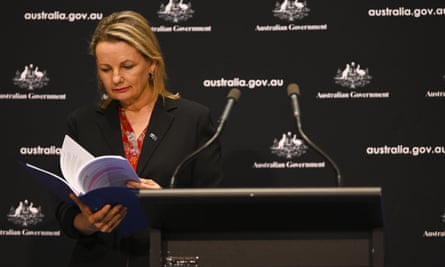Review of EPBC Act was delivered to government 11 days after process of drawing up legislation had begun.

Last modified on Wed 16 Sep 2020 03.31 AEST
The Morrison government started preparing controversial legislation to amend Australia’s environmental laws before it had received a report from a formal review into whether the act was working.
The environment department instructed the Office of Parliamentary Counsel to begin drafting the changes to the legislation on 19 June, 11 days before the government received the interim report of the review of Australia’s national environment laws.
Labor, the Greens and environment groups say the evidence, provided in answers to a Senate committee, suggests the government never intended to adopt the expert advice of the review, chaired by the former competition watchdog head Graeme Samuel.
Samuel delivered his interim report, a once-in-a-decade statutory review of the Environment Protection and Biodiversity Conservation (EPBC) Act, to the government on 30 June.
It found Australian governments had failed to protect Australia’s unique wildlife and habitats and recommended an overhaul of the laws to make the country’s systems of environmental protection more effective.
Samuel recommended the devolution of approval powers to the states along with the introduction of national environmental standards and an independent regulator to enforce the law.
In June, the environment minister, Sussan Ley, rejected the recommendation of an independent regulator, but said she would put a bill to parliament that streamlined the approval process and promised to introduce prototype standards to ensure environmental protection at the same time.
But the bill introduced in August was a near replica of failed “one-stop-shop” legislation introduced under former prime minister Tony Abbott. It contained no reference to any of Samuel’s other recommendations, including national standards. It passed the lower house last month after the government gagged debate.
In answers to the Senate committee, the environment department said it instructed the office of parliamentary counsel to start work on the bill after the prime minister, Scott Morrison, gave a speech on 15 June in which he said the government’s ultimate goal was to introduce “single touch” environmental approvals for developments.
“The prime minister noted that this would be further informed by the EPBC Act review,” the department said.
The department told the committee Samuel held meetings in May and June “in relation to the directions of the interim review, sharing his suggestion that devolution should be progressed”. This included a 4 June meeting with senior bureaucrats from the states and territories.
Labor and the Greens said the responses to the committee showed the government had ignored the independent review process.
Labor’s environment spokeswoman, Terri Butler, said the government had been “caught out” rehashing Abbott’s failed 2014 environment laws before even receiving Samuel’s interim advice.
“They have ignored their own independent review, broken their promise on national environment standards, cherry-picked the report, gagged debate in the parliament, and then rammed through a rehashed Tony Abbott bill, which is bad for the environment and bad for business,” she said.
The Greens’ environment spokeswoman, Sarah Hanson-Young, said the government had been disrespectful to Samuel and engaged in bad process and policy. “The government has shown their absolute arrogance by dismissing the expert advice before it had even been made available to them,” she said.
She said the Senate should not consider any changes to the bill until Samuel’s final report was tabled in October.
A spokesman for Ley said drafting instructions on the bill were initiated by the department.
“The government will consider a broader response and additional opportunities for reform once the reviewer provides his final report to government,” he said.
Suzanne Milthorpe, the national campaign manager at the Wilderness Society, said it had “become increasingly obvious” that the Morrison government was running a “two-track process” – asking the public and experts for their views through the review while simultaneously acting on predetermined decisions made “in favour of vested interests”.
“If they want to begin to re-establish trust here they should pull the Abbott-era bill before parliament, wait until the full review is completed and then bring the complete reforms forward together in one package,” she said.
Basha Stasak, from the Australian Conservation Foundation, said Samuel’s report had warned against the approach adopted by the Abbott government in 2014, in part because it lacked legislated national environmental standards.
“Yet before the federal government had even received Prof Samuel’s interim report, it was already drafting legislation to hand over environmental responsibility to weaker state regimes without national standards,” she said.
Crossbench senators have indicated they will not support the proposed changes, in part because they include nothing to improve the protection of Australia’s ailing wildlife and natural heritage.
.png)
No comments:
Post a Comment